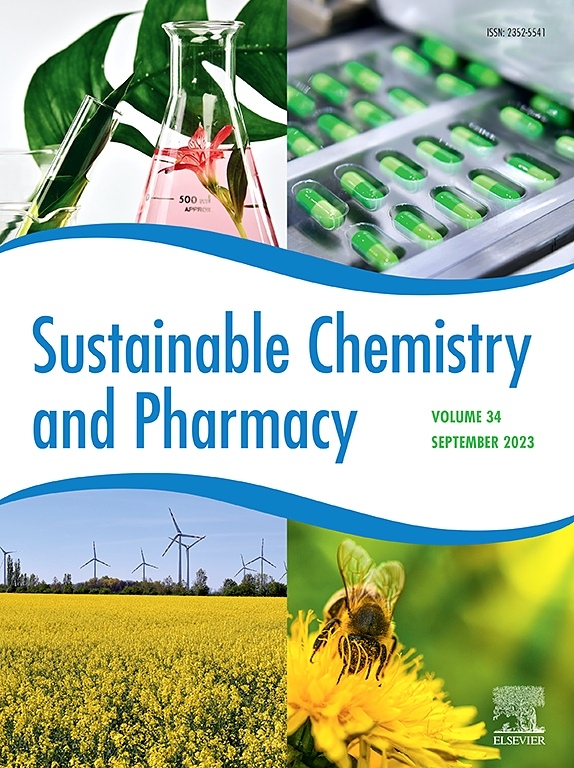在双相甲基异丁基酮/ H2O-NaCl中,纳米金属氧化物与HCl结合,葡萄糖高效生产5-羟甲基糠醛
IF 5.8
2区 化学
Q2 CHEMISTRY, MULTIDISCIPLINARY
引用次数: 0
摘要
5-羟甲基糠醛(HMF)是一种用途广泛的生物质衍生平台化合物,但从葡萄糖和纤维素中生产它仍然具有挑战性。在本研究中,几种具有不同Lewis酸的纳米金属氧化物(Al2O3, TiO2, ZrO2和SnO2)与微量HCl结合,在甲基异丁基酮(MIBK)/ H2O-NaCl双相体系中催化葡萄糖转化为HMF。在没有HCl的情况下,由于Brønsted的酸度不足,果糖在水相中形成并积累,限制了进一步脱水成HMF。HCl的加入有效地克服了这一瓶颈,Al2O3和HCl表现出最好的协同作用。在此条件下,氧化铝在180℃下的HMF收率为69.1%,且具有良好的可回收性。这项工作展示了一种有前途的方法,结合均相和多相催化,有效地将可再生碳水化合物转化为平台化学品。本文章由计算机程序翻译,如有差异,请以英文原文为准。

Efficient production of 5-hydroxymethylfurfural from glucose over the combination of nano-metal oxides and HCl in biphasic methyl isobutyl ketone/H2O–NaCl
5-Hydroxymethylfurfural (HMF) is a versatile biomass-derived platform compound, but its production from glucose and cellulose remains challenging. In this study, several nano-metal oxides (Al2O3, TiO2, ZrO2, and SnO2) with distinct Lewis acidities were combined with a trace amount of HCl to catalyze the conversion of glucose to HMF in a methyl isobutyl ketone (MIBK)/H2O–NaCl biphasic system. Without HCl, fructose was formed and accumulated in the aqueous phase due to insufficient Brønsted acidity, limiting further dehydration to HMF. The addition of HCl effectively overcame this bottleneck, with Al2O3 and HCl showing the best synergy. Under optimized conditions, a HMF yield of 69.1 % was achieved at 180 °C, and Al2O3 exhibited excellent recyclability. This work demonstrates a promising approach for combining homogeneous and heterogeneous catalysis for efficient conversion of renewable carbohydrates into platform chemicals.
求助全文
通过发布文献求助,成功后即可免费获取论文全文。
去求助
来源期刊

Sustainable Chemistry and Pharmacy
Environmental Science-Pollution
CiteScore
8.20
自引率
6.70%
发文量
274
审稿时长
37 days
期刊介绍:
Sustainable Chemistry and Pharmacy publishes research that is related to chemistry, pharmacy and sustainability science in a forward oriented manner. It provides a unique forum for the publication of innovative research on the intersection and overlap of chemistry and pharmacy on the one hand and sustainability on the other hand. This includes contributions related to increasing sustainability of chemistry and pharmaceutical science and industries itself as well as their products in relation to the contribution of these to sustainability itself. As an interdisciplinary and transdisciplinary journal it addresses all sustainability related issues along the life cycle of chemical and pharmaceutical products form resource related topics until the end of life of products. This includes not only natural science based approaches and issues but also from humanities, social science and economics as far as they are dealing with sustainability related to chemistry and pharmacy. Sustainable Chemistry and Pharmacy aims at bridging between disciplines as well as developing and developed countries.
 求助内容:
求助内容: 应助结果提醒方式:
应助结果提醒方式:


